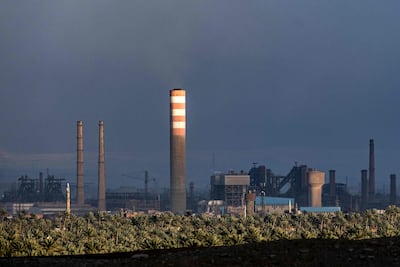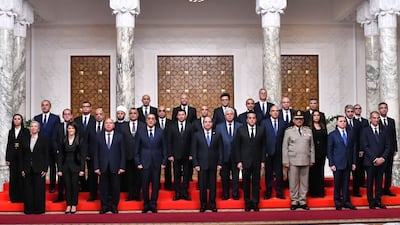In a ceremony held at Egypt's New Administrative Capital east of Cairo, members of the new Cabinet, headed by Prime Minister Mostafa Madbouly, took the oath of office before President Abdel Fattah El Sisi on Wednesday.
The latest changes were mandated by Mr El Sisi last month, when he instructed Mr Madbouly to form a new government and retain his position as Prime Minister.
The Cabinet aims to bring new perspective and expertise to address Egypt's challenges, the President has said.
While the formation includes 13 new ministers, with prominent changes in key departments, several prominent figures have also retained their positions in the new Cabinet including Interior Minister Mahmoud Tawfik and Transport Minister Kamel El Wazir.
Badr Abdel Aaty, Egypt's former ambassador to the EU, has been appointed Foreign Minister, replacing Sameh Shoukry, while Maj Gen Abdel Meguid Saqr succeeds Mohamed Zaki as Minister of Defence, who has been appointed a Presidential Advisor on Defense.
Ahmed Kojok, a veteran politician and lead negotiator in Egypt's financing deals with the IMF, both in 2016 – when Cairo agreed to receive $12 billion in loans from the fund – and in 2022, when negotiations on the recently approved $8 billion loan were finalised, is now Finance Minister. He replaces Mohamed Maait.
The Tourism Ministry will now be headed by Sherif Fathy Ali Attia, who previously served as Minister of Civil Aviation. He replaces Ahmed Issa, who served for only two years after being appointed in a reshuffle in August 2022, when 13 ministers were replaced.
Kamal El Wazir, formerly Transport Minister, has been elevated to the status of Deputy Prime Minister on Industry.
Mr El Wazir has been one of the most staunch supporters of the reforms of Mr El Sisi, with whom he enjoys a close relationship. Under his leadership, the country’s transport sector underwent significant development, which was funded by hefty loans from foreign creditors.
The Ministry of Petroleum and Mineral Resources will now be led by Karim Badawi, the managing director for Egypt and the East Mediterranean at US oil company Schlumberger. He replaces Tarek El Molla.
Mahmoud Esmat, formerly head of the Public Enterprises Ministry, will take charge of the Electricity and Renewable Energy Ministry at a time when daily power cuts – on account of natural gas shortages – have been met with mounting discontent. He has replaced Mohamed Shaker.

Several ministries have been merged under the new government formation. The Ministry of Planning and Economic Development has been integrated into the Ministry of International Co-operation, led by Rania Al Mashat.
Former planning minister Hala El Said has been elevated to the rank of Presidential Advisor on Economic Affairs.
The Ministry of Emigration and Egyptian Expatriates' Affairs has been dismantled and incorporated into the Foreign Ministry under Mr Abdel Aaty's leadership.
In addition to the Cabinet reshuffle, 16 new governors have been appointed, 11 of whom have military backgrounds. This is a significant change in the leadership of Egypt's 27 provinces.
Several prominent ministers, including Sameh Shoukry (Foreign Affairs), Mohamed Maait (Finance), Hala El Said (Planning), and Ali El Moselhy (Supply), have left their Cabinet posts.
Mr Moselhy in particular has come under fire over the past year amid the country’s continuing economic crisis which was accompanied by the lifting of subsidies on essential food items. He was questioned in Parliament in January amid widespread discontent over rising food prices.

Egypt's new Cabinet, particularly the Foreign Minister, faces a complex set of regional challenges. The Gaza war has strained some of Egypt's relationships in the Middle East and highlighted its limited influence over Israel's actions, despite their growing trade relations.
Additionally, civil wars in neighbouring Sudan and Libya pose significant security and diplomatic challenges.
Domestically, the government's decision to raise subsidised bread prices amid soaring inflation and a weakened currency has left many Egyptians struggling to afford basic necessities.
While the recent EU-Egypt investment conference secured a €1 billion ($1.08 billion) deal and potentially €40 billion in future investments, the country must still navigate a precarious balance between much-needed economic reforms and social welfare.


